V. Vale
In-search of Vale
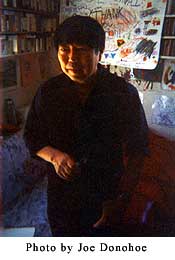 V. Vale lives in North Beach, one of the most scenic areas in a city not lacking in scenery. Famous for Beat Era clichés, it's still rich in imagery and culture, being the intersection of Chinatown and San Francisco's oldest Italian neighborhood where Sicilian dialect mixes with Cantonese. Vale is a charming individual, as I suppose he has to be as the principal editor and publisher, for over twenty years, of first Search and Destroy and then Research -- ground-breaking publications that have served as a comprehensive guide to any would-be explorer of subcultural phenomena.
He's also an old-school television-despising intellectual who owns a library of 20,000 books. Currently he is the head of V-Search, the third generation of Vale Publications. Interview conducted by R. Collision and Joe Donohoe. Filth Magazine #24 Summer 1996.
V. Vale lives in North Beach, one of the most scenic areas in a city not lacking in scenery. Famous for Beat Era clichés, it's still rich in imagery and culture, being the intersection of Chinatown and San Francisco's oldest Italian neighborhood where Sicilian dialect mixes with Cantonese. Vale is a charming individual, as I suppose he has to be as the principal editor and publisher, for over twenty years, of first Search and Destroy and then Research -- ground-breaking publications that have served as a comprehensive guide to any would-be explorer of subcultural phenomena.
He's also an old-school television-despising intellectual who owns a library of 20,000 books. Currently he is the head of V-Search, the third generation of Vale Publications. Interview conducted by R. Collision and Joe Donohoe. Filth Magazine #24 Summer 1996.
Filth: Do you feel uncomfortable talking about yourself and your past? Is that something that…
Vale: Well let me put this another way. I've always hated "the Cult of Personality," which is what mainstream media tries to create. I've also hated, and found very tiresome, so-called "confessional" programs. Oprah on TV. These programs are completely boring. You've seen one you've seen them all.
F: Are you talking about the more sensational side of broadcasting?
V: We're addressing the generic concept that you introduced, which is the concept of talking about things in the past. Allegedly revelatory and perhaps traumatic incidents that have happened to you. There's just way too much of that. This is mirrored in the zine world as well. You have a certain plethora of "personal" zines and frankly some of 'em are boring. Some of them I have gotten a personal attachment to; such as My Pathetic Life which comes out of the Tenderloin here in San Francisco. It's done by a guy named Doug. Following this zine is like not being able to wait for the next soap opera episode because you have an attachment to a certain character. Just because I like one personal narrative type zine doesn't mean I'm going to follow all of them though. I mean how can you learn from all of these things? It seems to me that we should be talking about the end of experience actually. It appears that, thanks to the role of the media, everything that has ever happened to everyone and anyone has been experienced by almost all of us. It's as if we're at a terminal experience overload point. That's the way I look at it. If I haven't lived through it I've read about someone who has. It seems like every possible psychodrama that happens between you and say, someone you're dating, has been written about.
F: You're saying that it's all really trivial?
V: I'm not saying that it's trivial. It's very important to the people that are living these things.
F: But you're saying it's really trite?
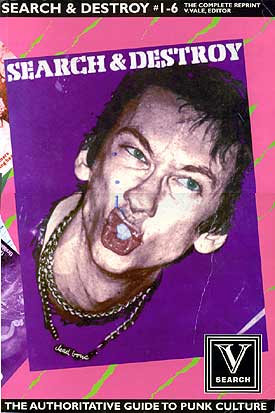
V: It's not trite at all. I will never devalue anyone's personal experience, or draw conclusions. I'm just saying that we're all trying to live a million lives and have only one life to live them in. That's why I read all my life. I don't watch television but I read a lot because I just feel that, at least in what I select to read, there's a great deal more depth, reflection and nuance. I love beautiful language. I have a love affair with the written word when it truly has some artistry and poetry. When it's been developed as opposed to something that just got slapped together by someone for the first time in their life because there's a Xerox down the street from their house. I think our birthright, in every possible way, has been taken from us by corporations and their lackeys, being all the mainstream media. Our real birthright is to have a community of close friends of a diversity and of all ages, not just five year groupings. They always have a name for each young new generation because they want all generations to be alienated. They don't really want you to have friends that range from five to eighty. If I have friends that fill in that range it's because I make an effort to. I want to know what all the "demographics" -- and I hate that word -- are thinking and concerned with. I have no desire to ghettoize myself with cutting-edge hipsters. You simply don't learn enough that way. I also like to be around as many social classes as possible, not just goatied hipsters.
F: Do you think that the corporate mentality…
V: Wait. I wasn't finished with what I was saying… What I was saying was that [the people] who have the most power are corporations, not kings and presidents, because the presidents are just the heads of advisory boards. It's government by committee now. The phrase used in the sixties and seventies, though I don't hear it anymore, was "military-industrial complex." I think it's still a valid term.
F: So you think we have an advisor's state as opposed to a traditional despot or hierarchically collective state, one where legal advisors determine policy?
V: Lobbyists I'd say. Lobbyists under the guise of advisors. Everybody wants their particular vested interests to be government. People are plugged into the mainstream media [which is created by this situation]. All the counter-culture people watch the X-Files and see the commercials and all watch TV pretty much. The only experience I've had with the X-Files is that I'll read all the interviews with the stars and whoever is the writer. That's how I know all about it.
F: Some people think that the X-Files is a subversive show.
V: Well that's what all the hipsters think. That it's a subversive show. That's their excuse for watching it. JG Ballard said that watching TV is more important than reading. Even though I'm a great admirer of Ballard and his ideas I don't practice that. There's so many books that I want to read instead. [This gets back to] the birthright thing. Our birthright. When you go back in time how was our culture invented and transmitted? It was probably around a fire or in a cave say and [what people were doing] was story telling. Not just one-way story telling. There was probably dialogue at this story telling. There were probably a bunch of people telling stories. Of course there were people making up poems and songs. It was probably intermixed. The way Homer did it. Homer is one of our oldest written bodies of culture that I know of. Homer, like Shakespeare, may not have actually existed but that doesn't matter because we have this wonderful store of myths that he, or the people who "were" Homer, transmitted. I think that this is taken from us by mass media. If you are watching the X-Files you're not sitting around connecting or telling stories, making jokes, you are consuming something that was sponsored by corporations and has been censored to death in ways you don't even know. Something that has been reduced.
F: But that kind of reduction started in the print medium. Before the proliferation of video and film images there was the print medium and that also could be reductionist. Language itself can be a limitation. Text language. When reading a book you're still subject to an author's biases.
V: Well…
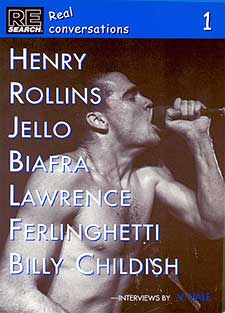 F: Look at Mein Kampf. Perfect example.
F: Look at Mein Kampf. Perfect example.
V: [contemptuously] What about Mein Kampf?
F: It's a book that is biased. A reduced perspective. Governments and institutions can still exercise control over the information that is available to you in print.
V: I don't have anything against bias. Everything is biased. Where did this word "bias" come from? There's never been any objectivity. Only subjectivity. A lot of things in life are just so simple and they seem to elude people because there's so many distractions. The distraction of corporate media for instance [points out the window] like that goddamned Budweiser sign on that truck. I don't watch TV because its job is to overload us, suffocate us so we can't think. Advertising logos will usually have one or more sexual hooks in them and what the hooks do is stick in your subconscious and annoy you because there's one or more contradictory elements in them. The human mind is programmed to worry itself to death over solutions to every conflict and every commercial they have is a conflict and you can't resolve them. That's why I don't watch TV. I don't want to see those ads. I don't want to be controlled -- as much as possible. There are plenty of people like Ballard, however, who can resist those hooks and turn them into their art form when they write their narratives like Ballard's Cocaine Nights because they integrate that imagery they get from advertising and turn it into their art form.
F: One of the interviewers in Zines Vol. I said that they have an ambiguous relationship with capitalism because it creates all this interesting junk.
V: Yeah Paul Lucas said that. Well regarding capitalism I don't think the world has ever had true communism. What was passed off as communism was really state controlled capitalism. There were no checks and balances so the most power-hungry and brutal simply rose to the top. The experiment in communism never happened. It was a myth. In this country everyone made a big deal about communism but few people knew anything about the theories. The US is allegedly a capitalist country but if anyone thinks that they can start on the bottom and work their way up to become the head of General Motors then forget it. That was just another myth designed to get you to work more hours, put up with shitty wages and accept everything that they hand to you.
F: What do you think about Larry Flynt? The current film suggests that he did have this Horatio Alger type of story, that he went from being this poor hill billy to being this multi-millionaire and champion of the First Amendment. What's your take on that?
V: I didn't see the film but I do think it's possible to start with no capital and then amass capital to a certain extent. Yeah I suppose it's possible to become a millionaire in America but millionaires aren't running this country. Billionaires and trillionaires are. A millionaire is nothing anymore and that's what Larry Flynt is. As to what kind of power he has… well I haven't read every Hustler Magazine but when it first came out in the seventies it was really kind of shocking, even by early punk rock standards. One reason that I would read it was that in addition to these centerfolds that men would masturbate to, they would have these pictures of huge piles of body parts from Vietnam. I didn't see those color pictures anywhere else. He certainly functioned as a kind of gadfly. He was always featuring articles on the CIA and military-industrial conspiracies. He was definitely trying to expose something he thought was going on and some real pro got him. You can tell it was a pro because he never got caught. He pissed the wrong person off and they hired a pro to do the hit. They probably wanted what happened to happen. They didn't kill him, they made him a somewhat pathetic example in a wheel chair who can't control his own bowel movements.
F: Why did you start Search and Destroy?
V: I didn't really have a choice. The seventies were really awful. The Disco Age. It was very alienating. I didn't think there was anything fun going on except in the gay community. I would sometimes go to events there because my neighbors were drag queens and that was the most fun I had before the coming of punk rock. I certainly had no interest in Led Zeppelin and at that time if you were reading about rock music you were reading about millionaires: People who were supposed to be doing these forbidden things, who were supposed to be outlaws. To me they weren't outlaws they were a joke. What did that have to do with me? I had no money, I was only making $200 a month and had to shop in thrift stores to survive. I worked at City Lights so I knew about Patti Smith very early and then I just started to read about the scene at CBGB's in New York.
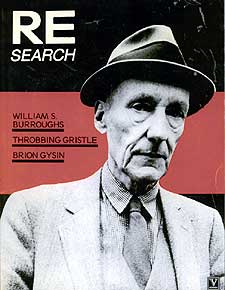 F: This was in '76?
F: This was in '76?
V: Earlier. Seventy-four. I wanted to go and check it out but at $200 a month I just couldn't afford it. I didn't really want to live in New York anyway, for a variety of reasons. The weather. Everyone's a careerist and self-centered. "What can you do for me?" Too many rats in a cage too. You need a frontier and leisure time to create something new and that's in short supply in New York.
F: Do you think that now in San Francisco "Manhattanization" is occuring? People are being priced out of their neighborhoods?
V: Yes absolutely. You can trace that back to Diane Feinstein who was elected by real estate intertests. They employed every kind of loop hole to get around rent control legislation at the time. Rent control was one of the few reasons I could live here back then.
F: Judging by the fact that you named your tabloid after a Stooges song, it seems like punk rock had a definite influence on you. What did you get out of punk when it first started?
V: Just a complete cultural revolution with no mass media types around to make movies about it or write it up like mad. So we had three solid years to incubate something without the scene getting diluted by a bunch of young people, and I don't mean to put down the young, but by a bunch of people not necessarily in it for the same reasons as the originals. When punk first started it didn't have a name and it wasn't defined. The media always portrayed punks as safety pins through the cheek and people spitting on people. That was the way you were supposed to behave, they said, and be violent too. The people who were in the original punk scene were just a bunch of weirdoes and artists and outcasts with some privileged people, to be sure, who were rebelling against their privileged backgrounds but at least they were doing something. The style was so radical back then that it actually was shocking and people would yell at you from passing cars. Do people yell at grunge people now? I don't think so.
F: Being poor how did you get money to finance Search and Destroy?
V: Christmas of '76 Allen Ginsberg was in town. I managed to hook up with him and I blurted out "Do you know anything about punk rock?" and he was "Of course, I've been to CBGB's." I didn't think he would have gone but of course he knew all about punk rock before me, or what would be called punk rock. I said that I wanted to do a publication but lacked the money so he just whipped out his checkbook and wrote me a check for a hundred dollars. Later I found out that he's done this literally a hundred times. So I took the check the same day to Lawrence Ferlinghetti and said "Why don't you give me a hundred dollars?" He just had to I guess (laughs). Well I think he very willingly gave me a check, out of his personal account, not the City Lights account, I might add. The manager of CL gave me $25 and they took out a paid ad. This was all a lot more money back then than now. I had a friend who was a doctor. He gave me $200 which is how much more we needed to cover the printing bill.. A sixteen page tabloid cost $400 for a thousand copies.
F: At a certain point Search and Destroy became Research which was a departure from punk music. Why did you do this?
V: Well Search and Destroy was based on an underground community, the likes of which we'll never see again I fear. It was very complex, what I call a social-cultural revolution. Because I published I knew a lot of people and went to a lot of people's homes. From the get go it was obvious that this was a completely new "lifestyle" -- though I hate that word too. You never saw Led Zeppelin posters on the wall or whoever was big back then. The rooms didn't look the same as non-punk residences. The way people lived wasn't the same. It was something in the air. We were all interested in things that the hippies and discoites weren't interested in. Everybody was reading Burroughs. We were going to different kinds of films. The Texas Chainsaw Massacre, The hills Have Eyes, Cannibal Holocaust. Really hard core kinds of films back then. Those were the good old days of films to be seen cheap in theaters before everyone had a VCR. Big screens with loud sound for a dollar. If you didn't have any money .99 for three films that you liked better than mainstream Hollywood films for $3.00 anyway was a good deal. We wanted the real thing. More sort of hard core experiences rather than candy coated experiences. We read hard core books and trashy magazines like Finger.
F: To what extent do you think Re-Search has influenced the middle class and the suburbs or whatever?
V: It's all been kind of indirect. My goal in publishing Re-Search was not so much to have a mainstream audience as to reach artists and what you could call movers and shakers. I can think of a bunch of social trends that probably would have been different without me or maybe I just made them catch on a lot faster. The most influential trend, I think, was the tattoo and body alteration movements. The recent lounge fad I don't think would have happened without Incredibly Strange Music Vols. I and II.
F: Definitely not.
V: Before I did Incredibly Strange Films there were hardly any books on those kinds of films and those that did exist merely made fun of them. Completely denigrating and superior, just like mass media in general. I put out a book that forced respect for these films and these directors. A book that didn't make fun of them. To me these were legitimately creative films with something to say.
F: It seems that a lot of things that were weird and strange back in the early punk days have now been assimilated into the mainstream. Exploitation films are now big Hollywood productions like Natural Born Killers. Do you think it's time for a new rebellion?
V: Somebody asked me where I get my ideas for the Re-Search books and I'd say they were there in the punk rock cultural revolution. Friends from the punk culture included Leo Zuleta, Bill Salmon and even Ed Hardy. Leo was responsible for helping start all the modern primitive type tattooing, the Borneo style. He was also into body piercing and modification and latex wear; he had a complete run of Atom Age Magazine. He got a lot of his ideas from National Geographic, the earlier the better. In those days you could get National Geographics by the nickel at garage sales. We weren't interested in what the contemporary mass media was offering. A lot of innovation in the punk rock community came from poverty and old records and things were bought second hand. Re-Search to me was just an amplification of the punk rock revolution. Whenever you have creative people with leisure time and not much money, which today is just about impossible since everybody has to work to death to pay their rent, and when people are dissatisfied with their society and too smart to work too much then something happens. I think everyone is born an artist. Everybody with reasonable intelligence is equipped with machinery to dream and use their imagination, and both of these are the wellsprings of creativity. So why aren't there more creative people? Well that's a complex question but it has something to do with everyone getting beaten down as they grow up. Being "raised." Being "educated."
F: Being controlled.
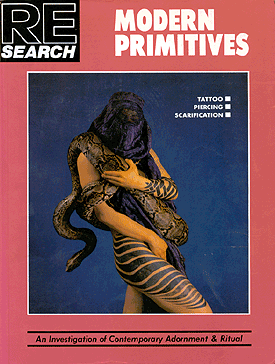
V: Of course. Being controlled.
F: Do you want to talk about becoming a father?
V: That's absolutely one of the best things that has ever happened to me. Of course I had been dead set against having children my entire life because I felt that if you were going to have children you should have income to support children. You should have a stable home and time for them. I don't consider daycare an acceptable solution. What happened to me took me completely by surprise. You could say that it was a birth control accident but I don't think there are any such accidents. I certainly wouldn't recommend having a child to anyone in their twenties. People should travel first. As soon as I started making money with my typesetting business I started traveling. That business is also one of the reasons I didn't have to compromise in the early Re-Search books. Economics can definitely constrain you. It can constrain your art form and publishing is my art form. Self-publishing is good too in that me and Marian both work at home and can spend time with Valentine. We have friends who baby sit for us so occasionally we can dash out and see a film but boy, if you don't have an income I don't think it's a good idea to have children.
F: What are your plans after V-Search Zines II?
V: Oh you'll find out. I don't want to give anything away. I've got a million ideas.